QuestionQUESTION: The water in my son's 10 gallon smells a little odd. Not horrible but not like regular tank water which has an "algaeish" smell. This tank is relatively new (since 1/24/08) ammonia level is 0, nitite - 0, nitrate - low, ph is 7.0. The water was cloudy for about a week and a half (all chemical levels were good then too) I added some floss into the filter bag and the cloudiness cleared up in 2 days. The fish are all relatively small right now and very healthy, vigorous and hungry (only fed twice a day - I don't overfeed because tank is completely clear of any food within 30 minutes). 2 Platys, 2 guppies, 3 Pristella tetras, 1 pepper cory and 1 very small panda cory. So far everyone fits fine - if in future some fish get too big they will be moved to my other son's 20 gallon tank. I also do 20% water changes every 2-4 weeks and there is some live plants. Everything I've read says any smell is bad so I'm a little nervous especially because it's such a small tank and there's no room for error in smaller tanks.
ANSWER: Hi Amy,
It's probably the plants that are keeping your nitrates low, fast growing plants are especially efficient at keeping nitrates down. The smell you are smelling is probably just the water getting stale. Do you vacuum the gravel when you change water? I wouldn't gravel vac more than once a month, however, you *really* ought to be changing water more often than this!
Try changing 25% of the water weekly. In small tanks like this, it's important to keep the water fresh. Plants do best in such water. If you are worried about not giving them enough nutrients, get a liquid fertilizer such as Nutri-Gro. Only fertilize if the plants are growing and thriving. Some plants grow very slowly such as Anubias and Java fern, no need to liquid fertilize these, although a "fertilizer tab" specially made for aquariums placed near the root zone would help.
I recommend you change 25% of the water weekly and if need be, add fertilizer. Make sure to get a gravel vac if you don't already, as it makes the chore of taking out 3 gallons of water much less daunting than a scoop! The "algaeish" smell is more common in aquariums with plants, but if you are indeed finding you have algae in the tank, try a ramshorn snail. They do not maul plants and are the right size for a 10 gallon tank. You could also try a bristlenose plecostomus if you are certain you will be upgrading to a 20 gallon. If you offer them fresh veggies often they will generally leave plants alone.
One last thing: do you feed only flake? Flake is actually one of the more polluting foods. They are very concentrated, and flakes with high levels of protein can make water smell scummy. Pellets are cleaner, but you have to be very careful not to overfeed. You can feed your fish as many flakes as will fit on a dime, or half as many pellets. It would be a real treat for your fish to alternate the dry foods with wet frozen foods such as bloodworms and vitamin enhance brine shrimp. Less commonly available but also good are krill and daphnia. The link below will give you all sorts of ideas for fresh and frozen foods:
http://fish.mongabay.com/food.htm
Don't forget that flakes are all formulated differently - your livebearers really need a "veggie flake" or a "Spirulina flake" to do well, since regular freshwater flakes don't have enough greens.
I hope that helps, take care!
Nicole
---------- FOLLOW-UP ----------
QUESTION: Okay here we go again - the 10 gallon tank doesn't smell now - I've been doing weekly water changes(10-15%). Ammonia is at zero, ph is pretty constant at 7, nitrites - 0 nitrates not bad. I added snail and he's been very busy. I do feed flake food - the crisps where you count out one per one inch of fish and it gets completely eaten within 5 minutes (the corys are very good at "hoovering" up everything) Sometimes I will give them bloodworms but they are only mildly interested. Believe it or not they appear to love a squished up pea every once in a while.
Now my problem involves the guppies and platys. The platys came to us pregnant and have been giving birth since we got them. The two guppies are male and have been relentlessly stalking these fish sometimes it looked like they were trying to mate. Well ultimately they seem to have stressed them out and no babies (we had only seen 2-3 in past) have made it longer than 10 days. By the time we saw these fry I would of thought they would be too big for a guppy to eat so I'm not completely sure they were the culprits. About a week and a half ago I noticed the platys seemed really stressed hovering up in the back of the tank with clamped fins. Well then suddenly one of the guppies seemed to be having trouble. He was hovering at top with what looked like a small wound by his side gill - the next day he was dead. A day later one of the platys came down with ick and then I noticed 4 fry at bottom of tank. (note I have had these 2 platys for almost 2 months now) I started treating tank with QuICK cure but only put 1 drop per 2 gallons because there are tetras in tank. Well this platy seemed to get worse fast and then she died within a day. I noticed some ick on the other platy so I have been still treating tank (we are on day 5 now) she seems to be holding in there - not really eating though. The sole remaining guppy boy who previously was the more annoying of the two seems (now this is gonna sound silly) depressed. Nothing appears to be wrong but he's hovering and hiding at top not bugging anyone (so not like him!) and not eating. Everyone else seems healthy and normal - going about their usual stuff. The Panda cory has taken to swimming laps up and sound the front of the tank. He needs a panda buddy and I had planned on adding one this past weekend but fish store had just gotten them in and we were waiting to make sure they were healthy and we didn't want to over stress them by too many moves too soon (this is a mom and pop type pet store) But with all the chaos going on in the tank we are waiting.
Got any ideas about whats going on. My theory is guppies stressed out platys with too much stalking, platys wouldn't give birth, that made them even more stressed finally all hell breaks loose fish are born, fish die and fish get depressed and life appears to go on for the bottom tank dwellers (sounds like a movie)
AnswerHi Amy,
10 gallon tanks are hard to keep stable. I have a hard enough time with my 15 gallon tank. I honestly recommend to anyone who asks that they start with a 20 gallon long tank, or a 29 gallon tank (the 20 gallon long is really the best value for the money).
One thing you absolutely need if you're going to try to make a little tank work is a test kit that measures the following:
ammonia
nitrites
nitrates
pH
alkalinity
Those 5 things are the most important. Ammonia and nitrites both have to be absolutely zero. If you see any nitrite, that means your filter is not doing the job - you may need to upgrade, I recommend the AquaClear filters since their media is so flexible. Just rinse and reuse their foam sponges and ceramic rings, no cartridges to replace. Water changes and light feeding helps with keeping nitrite 0 ppm.
Nitrates with an A should be kept low. 20 ppm or lower. If you see high nitrates, you need to change more water weekly - water high in nitrates is stale water. Better to see high nitrAtes than nitrItes!
pH and alkalinity for livebearers needs to be on the high side. That means that it should be a higher than neutral pH, so 7 or higher, and alkalinity needs to be at least moderate, preferably high - *here's why* this is so important. Alkalinity keeps pH stable. If your alkalinity is low, your pH will be driven down, stressing your fish a bunch in the process! People who used bottled water thinking they are giving their fish "pure" water, are actually hurting their fish because this "pure" water doesn't have any alkalinity reserve! So if you find your alkalinity is low, there are ways to buffer it. You can read online all about it, this article explains it most clearly:
http://www.drhelm.com/aquarium/chemistry.html
I know it sounds complicated, but water chemistry in the aquarium is really just as important as quality. pH shock is just as likely to cause ich in your fish as presence of ammonia and nitrites, just maybe not as fast. So be sure to investigate these possibilities.
While I agree that the male guppy sounds depressed, and clamped fins are definitely signs of an unhappy fish, and stressful conditions make for unhappy fish which are therefore more prone to ich...I believe the problem lies in the water chemistry, maybe the water quality also. It's a no-brainer because 99% of the problems we see in fish that have had nothing different added to their environment (a source of pathogens such as a new fish) are due to these two factors being off.
I can't remember how long a course of QuICK cure is supposed to last, but when the medication is done, if you still see ich, I would not dose again. This is a very harsh medication, I am glad you are half-dosing. Instead of meds, next time try using heat to speed up the life cycle of the ich and eradicate it. Slowly (maybe 1 degree per hour or less) raise the temperature to 84 degrees. Add extra aeration, such as an airstone powered by an air pump via airline tubing, or a powerhead at the surface of the water to agitate the surface. At high temps the water has a low dissolved oxygen content, so it helps a lot to have extra aeration. Stressed fish need well oxygenated water, so even if you aren't planning on raising the temp, add more aeration!
Keeping the aquarium at 84 degrees for 2 weeks will eliminate the ich just as effectively as medication. Some fish who like warm water (such as blue rams) can have their temperature raised as high as 89 degrees in my experience, this eradicates the ich in less time, but most fish cannot stand to be kept this warm for very long.
If you only had the livebearers in there, I would say to add salt - pristella tetras don't mind hard water with a bit of salt, and salt helps with ich. You can add up to 1 teaspoon per 5 gallons but I would not add more, the corys will definitely not take kindly to the salt - won't be so crazy about the high temps either, but sometimes you have to take the lesser of two evils. If you have aquarium salt, that's fine, use that, but it's the same as kosher salt or sea salt from the grocery store (non-iodized salt is what you need).
Panda corys are one of the less hardy kinds, so keep an eye out, but peppered corydoras and bronze corydoras are both very hardy. These two kinds will generally school with each other, also.
Good luck, hope everything gets better!
Nicole

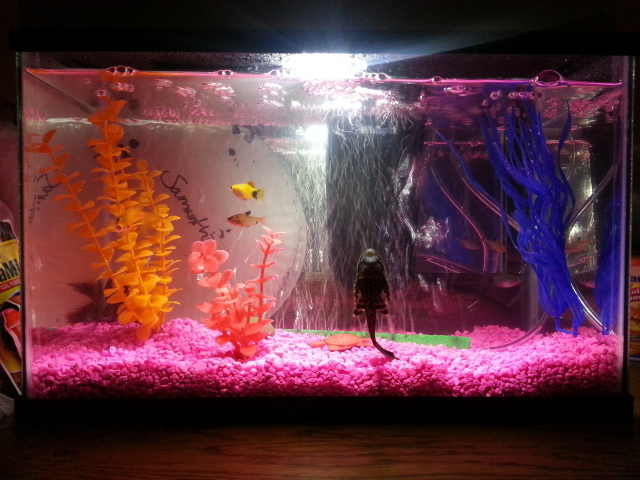 help! I have a new 5 gal tank & too many fish, I think
Question
aquarium
My daughter won 2 goldfish at
help! I have a new 5 gal tank & too many fish, I think
Question
aquarium
My daughter won 2 goldfish at
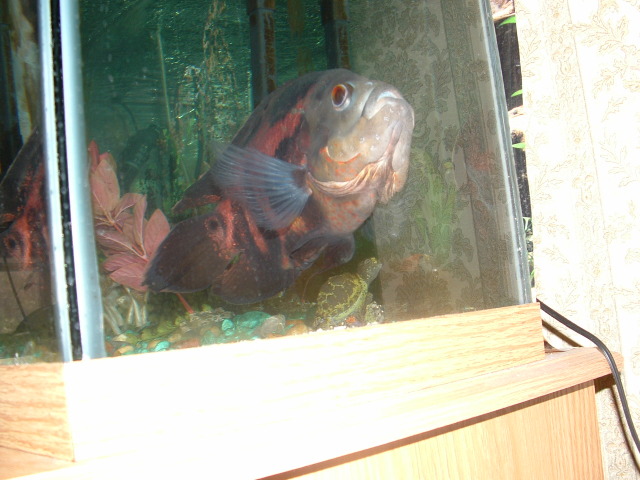 high nitrites Oscar mouth opening and closing
QuestionQUESTION: You have helped me before. I HAVE A 7
high nitrites Oscar mouth opening and closing
QuestionQUESTION: You have helped me before. I HAVE A 7
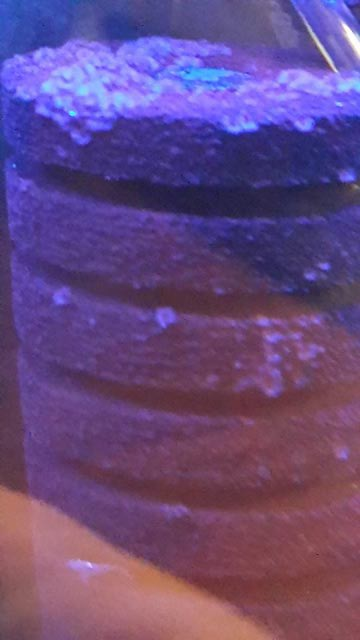 Pink fungus?
Question
pink fungus pink fungus
Hello,
I
Pink fungus?
Question
pink fungus pink fungus
Hello,
I
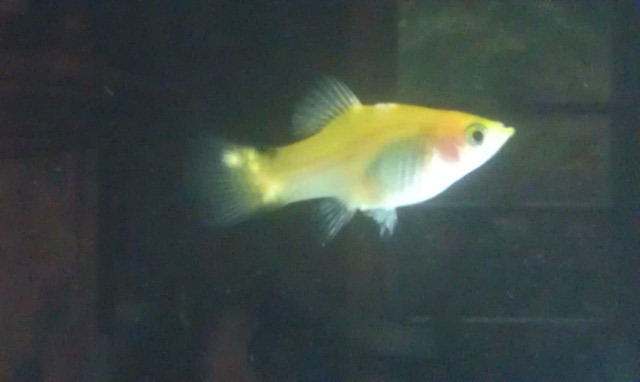 Large white patches
Question
Yellow Platy with spot
Ive had this fem
Large white patches
Question
Yellow Platy with spot
Ive had this fem
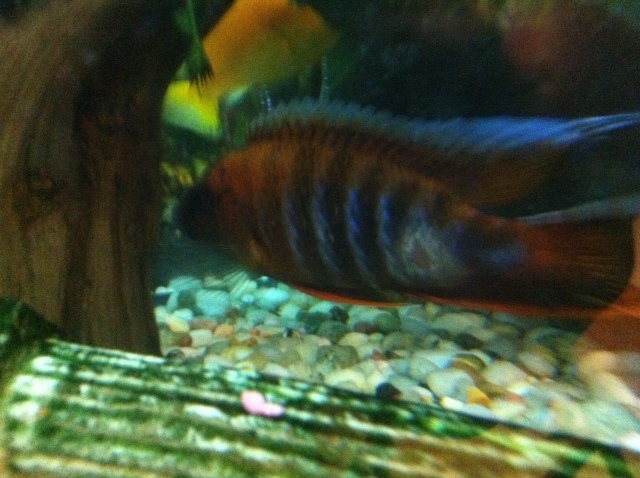 Sick cichlids! i dont want to lose them
QuestionQUESTION: Hello Renee, first off, thank you for
Sick cichlids! i dont want to lose them
QuestionQUESTION: Hello Renee, first off, thank you for